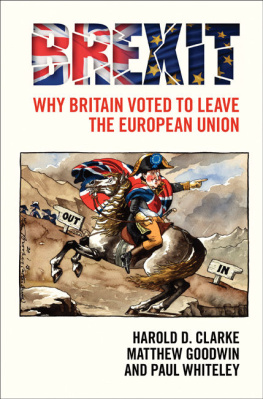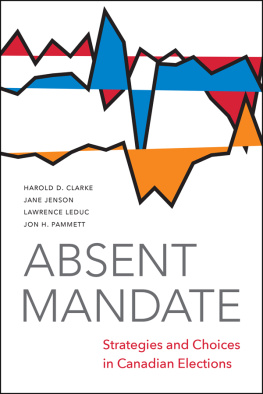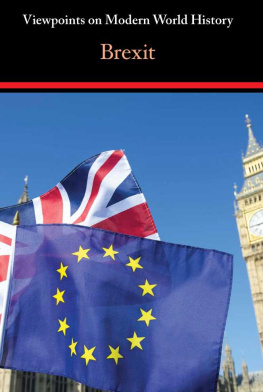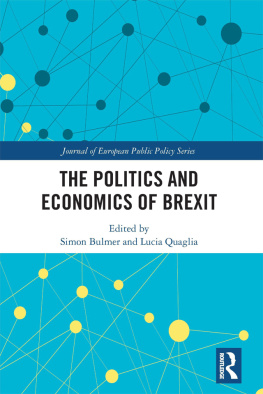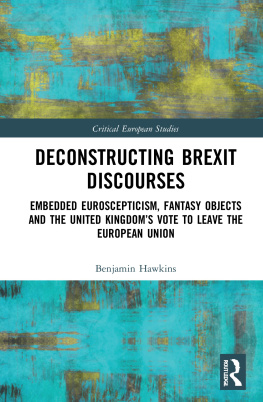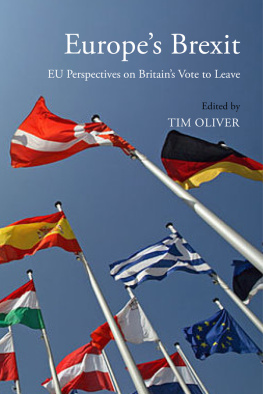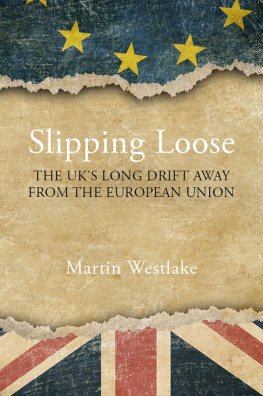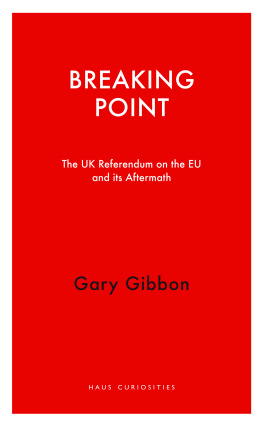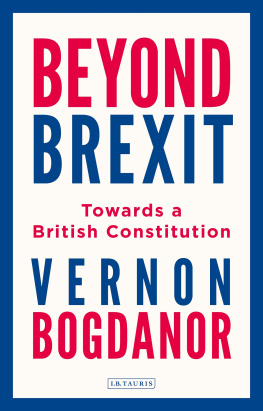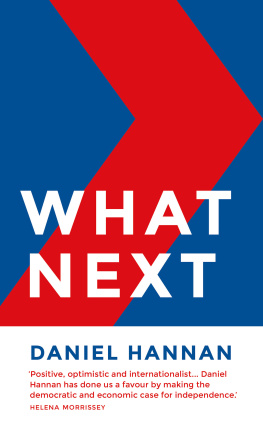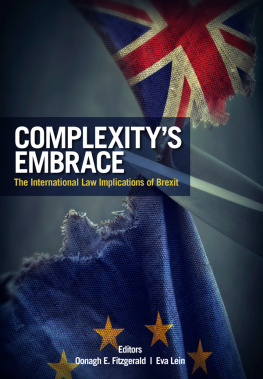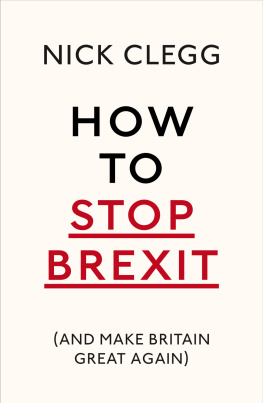Brexit
In June 2016 the United Kingdom shocked the world by voting to leave the European Union. As this book reveals, the historic vote for a Brexit marked the culmination of trends in domestic politics and in the UKs relationship with the EU that have been building over many years. Drawing on a wealth of survey evidence collected over more than 10 years, this book explains why a majority of people decided to ignore much of the national and international community and vote for Brexit. Drawing on past research on voting in major referendums in Europe and elsewhere, a team of leading academic experts analyse changes in the UKs party system that were catalysts for the referendum vote, including the rise of the UK Independence Party (UKIP), the dynamics of public opinion during an unforgettable and divisive referendum campaign, the factors that influenced how people voted and the likely economic and political impact of this historic decision.
Harold D. Clarke is Ashbel Smith Professor at the University of Texas, Dallas. His recent books include Austerity and Political Choice in Britain (2015) and Affluence, Austerity and Electoral Change in Britain (Cambridge, 2013).
Matthew Goodwin is Professor of Political Science at the University of Kent and Senior Visiting Fellow at Chatham House, London. He is the author of four books, including Revolt on the Right: Explaining Public Support for the Radical Right in Britain (2014), which was awarded the Paddy Power Political Book of the Year 2015. In early 2016 he authored a report that predicted Brexit. Matthew tweets @GoodwinMJ.
Paul Whiteley is a Professor of Government at the University of Essex and is currently the director for the Centre for the Study of Integrity at the University of Essex. He is the author of eighteen academic books including studies of electoral behaviour, party members and citizenship in Britain.
Brexit
Why Britain Voted to Leave the European Union
Harold D. Clarke
University of Texas, Dallas
Matthew Goodwin
University of Kent, Canterbury
Paul Whiteley
University of Essex

University Printing House, Cambridge CB2 8BS, United Kingdom
One Liberty Plaza, 20th Floor, New York, NY 10006, USA
477 Williamstown Road, Port Melbourne, VIC 3207, Australia
4843/24, 2nd Floor, Ansari Road, Daryaganj, Delhi 110002, India
79 Anson Road, #06-04/06, Singapore 079906
Cambridge University Press is part of the University of Cambridge.
It furthers the Universitys mission by disseminating knowledge in the pursuit of education, learning, and research at the highest international levels of excellence.
www.cambridge.org
Information on this title: www.cambridge.org/9781107150720
DOI: 10.1017/9781316584408
Harold D. Clarke, Matthew Goodwin and Paul Whiteley 2017
This publication is in copyright. Subject to statutory exception and to the provisions of relevant collective licensing agreements, no reproduction of any part may take place without the written permission of Cambridge University Press.
First published 2017
Printed in the United Kingdom by TJ International Ltd. Padstow Cornwall
A catalogue record for this publication is available from the British Library.
ISBN 978-1-107-15072-0 Hardback
ISBN 978-1-316-60504-2 Paperback
Cambridge University Press has no responsibility for the persistence or accuracy of URLs for external or third-party internet websites referred to in this publication and does not guarantee that any content on such websites is, or will remain, accurate or appropriate.
Every week we send 350 million to Brussels. Id rather that we control how to spend that money, and if I had that control I would spend it on the NHS.
Gisela Stuart, 15 April 2016
Theresa May says its difficult to control immigration as part of the EU. Shes wrong it is not difficult, its impossible.
Nigel Farage, 29 April 2016
maybe some point down the line, there might be a UKUS trade agreement, but its not going to happen any time soon the UK is going to be in the back of the queue
Barack Obama, 22 April 2016
I am absolutely convinced that our economic security will be better if we stay in a reformed European Union and it will be seriously at risk if we were to leave.
David Cameron, 15 May 2016
Napoleon, Hitler, various people tried this [unifying Europe], and it ends tragically. The EU is an attempt to do this by different methods.
Boris Johnson, 15 May 2016
As Chancellor, I would have a responsibility to try to restore stability to the public finances and that would mean an emergency Budget where we would have to increase taxes and cut spending [Q]uitting the EU would mean less money. Billions less. Its a lose-lose situation for British families and we shouldnt risk it.
George Osborne, 15 June 2016
Its a pretty overwhelming case when you have a huge body of economists [that agree] that its going to cost [the UK], its going to be negative for income purposes, its going to reduce trade most likely as a result of uncertainty and those are blatant facts.
Christine Lagarde, 17 June 2016
We know how bad our government is at defending our borders, and within a few years all of these people [Middle East refugees] will have EU passports. We are much less safe as part of this European Union.
Nigel Farage, 22 June 2016
Contents
Figures
Tables
Foreword
Brexit changed everything. Or at least so it seemed. For many amongst what have come to be known as the liberal metropolitan elite, it overturned several decades of thinking about what Britain is and where it is headed. What have we become? became a common refrain around middle-class dinner tables.
Obviously, and as ever, reality is slightly more complicated. Britains decision to leave the European Union revealed as much about how its society had been changing for many years as it did about the impact of the short and bitter referendum campaign itself.
Yet there can be little doubt that the decision that was taken will have profound consequences for the future of the country. Obviously, the nature of its relationship with the European Union will change. As important, however, will be the impact of the decision on our politics.
Already, we see the way in which the Scottish National Party is using Brexit to further its own political and independence-related agendas. There is lingering uncertainty about the future of the UK Independence Party now its central aim has been achieved, and still more over where its voters might go should they decide to withdraw their support. Prime Minister Theresa May clearly has half an eye on these people as she renews her pledge to reduce immigration and bring the country out from under the jurisdiction of the EUs Court. Meanwhile, the Labour Party, largely ineffective within parliament as Her Majestys Opposition, confronts the danger of haemorrhaging votes at the next election as its leaders popularity rating shows no sign of improving.
In order to understand the way in which politics might develop at this unique moment in our history, it is crucial to have a firm understanding of what has happened to date. And here it is important to understand the importance of careful, detailed, empirically based analysis.
The failure of pollsters accurately to predict not only the Brexit outcome, but also the election of Donald Trump and, 18 months earlier, of a majority Conservative Government in the UK have led many people to conclude that an accurate understanding of contemporary politics is impossible. Yet this is to confuse prediction with explanation. The former has never been simple, and depends, in part, on the ability of pollsters to predict who will vote at all. In contrast, whilst failing to anticipate the outcomes, analysts have proven extremely good at identifying the kinds of choices that people are liable to make.
Next page
